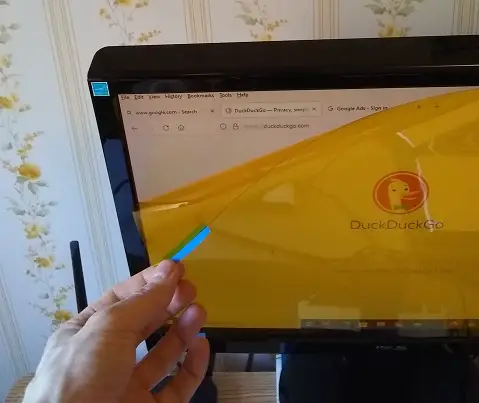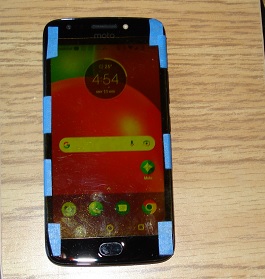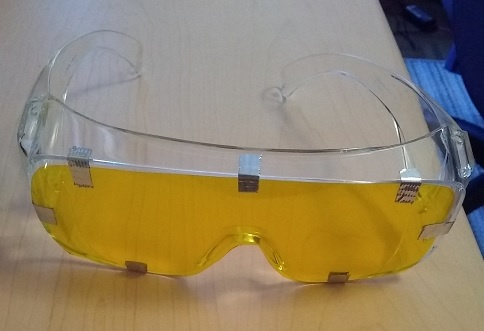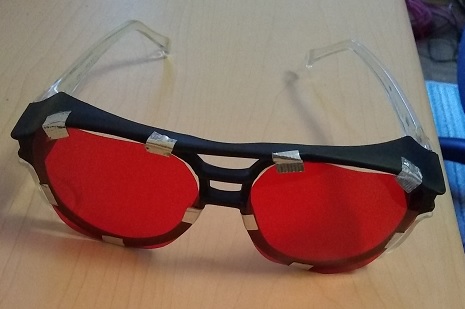Homemade Blue Light Filter
There is growing evidence that blue light from artificial sources, such as LED lights and computer/phone screens, are damaging to the eyes. If you've ever experienced dry irritated eyes from using your computer or phone for long periods then you already might have a sense that the light from these devices is harming your eyes. But since artificial sources of blue light are so entrenched in our society there is no way to totally avoid exposure to them. It seems that we are stuck with them, and our health regulators are doing nothing to address this problem.Commercial products are available which reduce blue light exposure but they seem to be very lacking or just too expensive. Not being satisfied with that, I decided to make my own inexpensive and homemade blue light filters. It turns out that you can buy inexpensive color filters used for stage lighting. In particular, a company called ROSCO produces color filters called gel sheets which filter out different parts of the visible light spectrum. The two gel sheets I bought from them are Roscolux R312 (canary yellow) and Roscolux R19 (fire). Roscolux R312 has a yellowish tint and filters out almost all blue light. Roscolux R19 has a reddish tint and filters out almost all blue and green light. Each filter sheet has a size of 20 inches by 24 inches, and each sheet costs about $10 plus shipping. For me, one sheet of each was enough.
I then cut out shapes from the Roscolux R312 sheets so that they fit on my computer screen, my phone display, and the lenses of clear safety glasses (which provide convenient and cheap lenses to put over my eyes). I then taped the filters onto them. See pictures below.



On a second pair of safety glasses I placed the Roscolux R19 filter (see below). At night time I would put these on to filter out both blue and green light. This mimics the lower levels of light illumination suitable for the night time according to the requirements of our circadian rhythm. Although blue light is a known disruptor of the circadian rhythm in the evening, green light might be as well to an extent. Computer and mobile screens are easily visible through the Roscolux R312, but might be a bit hard to read through the Roscolux R19. You can try playing around with the brightness of the screens to see if that helps, or just make the text size bigger on the screen.

Using Roscolux R312 on my computer and phone screen is self-explanatory since they both emit blue light and this filter simply blocks that. And also, having this filter on safety glasses I put on is helpful if I go anywhere in the house with LED lights turned on, for an extended period of time. They are also useful when watching television. Modern televisions also emit excessive blue light.
I recognize that there are commercial and more fashionable alternatives for filtering blue light, but from what I've seen they are usually not very good, or they're just too expensive. For example, blue light filters that you buy which you put over your computer screen are clear with little or no tint. But from what I've seen, clear filters remove only a part of the blue light. Based on my own research, an effective blue light filter must be tinted in color, either yellow or red. This means that what you look at through the filter will be yellowish or reddish in appearance, and that can't be avoided if you want to filter out blue light. But in my opinion, as long as everything is clear to read and see then it's not a problem if it's tinted yellow or red. And also, I only use these filters indoors, and not when I'm outside or driving. Natural sunlight does not seem to carry the same risk as artificial blue light even though the Sun emits a lot of blue light.
When looking for blue light filters it is necessary to get the transmission spectrum of the filters to see if they indeed filter out blue light. The transmission spectrum is important technical data which should come with the product. For a blue light filter to be completely effective, it must block wavelengths of light in the range 400–500 nm (nanometers). In other words, over this wavelength range there must be zero transmission shown in the transmission spectrum. Don't simply buy yellow tinted or red tinted filters thinking that they will block blue light. They might only block part of it. Make sure and get the transmission spectrum for the filters, and check that the light transmission through the filters is 0% (or close to it) over the range 400-500 nm.
The most harmful component of visible light is the blue color, which has a wavelength range of 400–500 nm. This is what you want to filter out as much as possible from artificial light sources. This is explained in the following article which is also where I found out about Roscolux gel filters: "Removal of the blue component of light significantly decreases retinal damage after high intensity exposure" Link: https://www.ncbi.nlm.nih.gov/pmc/articles/PMC5854379/
Blue light exposure from artificial sources is a serious and under appreciated public health problem. More and more people are waking up to this but industry and regulators, as usual, are slow to respond. I went to great lengths to deal with eye irritation from computer use and the literature is very scarce on solutions. In addition to making homemade blue light filters, I also replaced the CFL and LED lights with traditional incandescent bulbs in two of the rooms I spend the most time in, to further reduce my exposure to blue light. Furthermore, I am also taking a fish oil supplement rich in Omega-3, which combats inflammation in the body, including the eyes. So far it all seems to have helped quite a bit, and my eyes feel a lot better.
I realize that this is a health related topic, and I am not a health expert, but since this topic overlaps with physics and the light spectrum, I felt I should cover it. My intent is just to explain what I have done purely for information purposes, and then you can decide for yourself what you want to do. Do your own independent research of course, and if possible talk to an eye doctor and find out what they say.
This is the best information I can provide as of the time I wrote this article (June 24, 2022). I will update this page when new and improved information comes along.
Return to Miscellaneous Physics page
Return to Real World Physics Problems home page
Free Newsletter
Subscribe to my free newsletter below. In it I explore physics ideas that seem like science fiction but could become reality in the distant future. I develop these ideas with the help of AI. I will send it out a few times a month.